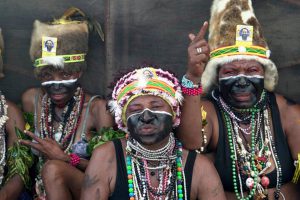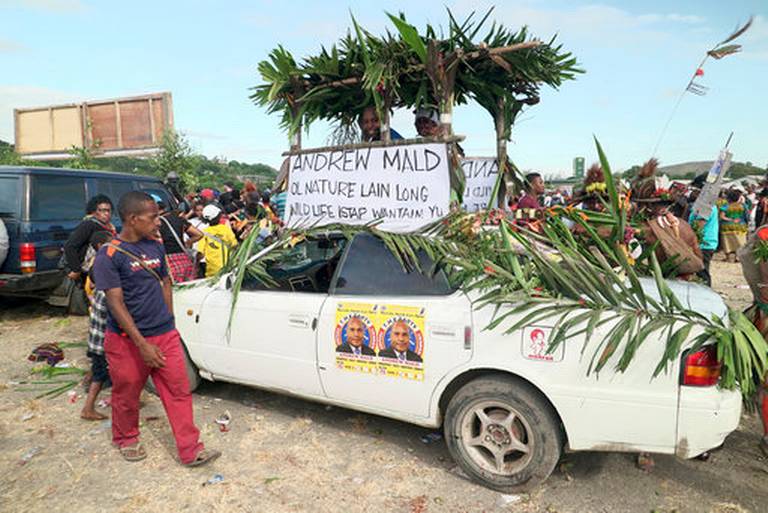Material belongs to: The Olympian.
Papua New Guinea voters are going to the polls in elections dominated by corruption allegations hanging over their prime minister and the South Pacific island nation’s deepening economic woes.
Voting started Saturday and will continue until July 8 through a complex exercise safeguarded by police and soldiers in a rugged country where few roads penetrate a mountainous jungle interior, and where allegations of corruption and violence often mar elections.
Vote counting will likely take another two weeks after the polls close, and which party the newly elected lawmakers will support to form a government will not be known for certain until they take office and arrive in the capital, Port Moresby.
Prime Minister Peter O’Neill is seeking a second five-year term for a coalition government led by his People’s National Congress party.
Papua New Guinea is considered one of the world’s most corrupt countries, ranking 136th among 176 nations last year in Transparency International’s Corruption Perception Index. Political loyalties are routinely bought and sold.

Allegations of corruption and violence also mar the process of gathering votes in a diverse country of more than 800 languages, where most of the 7.7 million people are traditional subsistence farmers and women continue to be slain on suspicion of witchcraft.
Voting in Port Moresby was postponed on Tuesday until Friday because polling officials had gone on strike due to pay issues, Australian Broadcasting Corp. reported.
Scrutineers in many parts of the country were reporting problems with the electoral roll and the distribution of ballot papers since the weekend, ABC said.
O’Neill, 52, came to power in extraordinary circumstances in 2011 when he replaced Prime Minister Michael Somare, who was in Singapore undergoing heart surgery.
In a constitutional crisis extraordinary even for Papua New Guinea, both Somare and O’Neill claimed for several months to be the country’s prime minister. Somare’s claim had the support of the Supreme Court, while O’Neill had the backing of a parliamentary majority. The rival leaders appointed different police chiefs, and the military was also divided.
The controversy passed when O’Neill won a mandate in the June 2012 election with promises of free education and health care. He also had promised to tackle corruption, but he disbanded the investigating task force he had created after it came after him with allegations of fraud involving government payments made to a private law firm.
The Supreme Court ordered that his arrest warrant not be executed.
But many Papua New Guineans complain that O’Neill has placed himself above the law. Police opened fire on student protesters in June last year as they demanded the prime minister answer to police over the corruption allegations. Eight students were shot and dozen were injured.
O’Neill subsequently survived a no-confidence motion against him in Parliament when a majority of the 111 lawmakers voted it down.
Bryant Allen, a Papua New Guinea expert at Australian National University in Canberra, said losing the election could cost O’Neill his freedom.
“If he doesn’t win, I would think he might be off for a holiday at Bomana,” Allen said, referring to a prison outside Port Moresby.
O’Neill sees an election win as a public vindication. “I am not above the law,” he told Australia’s SBS television in a recent interview.
“I am quite happy to go to the courts like anyone else to seek the protection the courts can give me as a citizen of our country, which I’ve done on many occasions, and I’ve proven time and time again that those allegations are not true and have been politically motivated in many cases, so I think the ballot will speak for itself,” O’Neill said.
Opposition leader Don Polye, a 50-year-old former minister in O’Neill’s government and leader of the Triumph Heritage Empowerment Party, is campaigning against what he described as the government’s economic mismanagement through burgeoning debt.
“I’m telling you debt will never save Papua New Guinea. It’s burying us deeper and deeper into the coffin box,” Polye told a rally in the highlands town of Tari.
Papua New Guinea’s largest export is liquefied natural gas. The ExxonMobil-operated PNG LNG project began exporting to Japan in 2014, but many are asking where the revenue has gone.
Paul Flanagan, an Australian economist who was once an adviser to the Papua New Guinea Treasury Department, described the national budget for 2017 released in November as “fiscally fraudulent.”
Papua New Guinea-born Canberra lawyer Bal Kama, a doctorate candidate whose dissertation is the relationship between the judiciary and Parliament under the constitution, said the government could not blame unstable global commodity prices for its economic woes.
Schools and hospitals are running out of money to continue to operate, Kama said.
But he said the government has had successes in infrastructure projects, especially in Port Moresby. The government has been raising the country’s profile by hosting major international events, including the APEC annual summit of world leaders in November next year in Port Moresby, which could include President Donald Trump.
“Prime Minister O’Neill may have administered an admirably ambitious regime, but its controversies stand to overshadow its daring achievements,” Kama wrote on the Australian National University’s Development Policy Center blog.
 info@anticorr.media
info@anticorr.media

